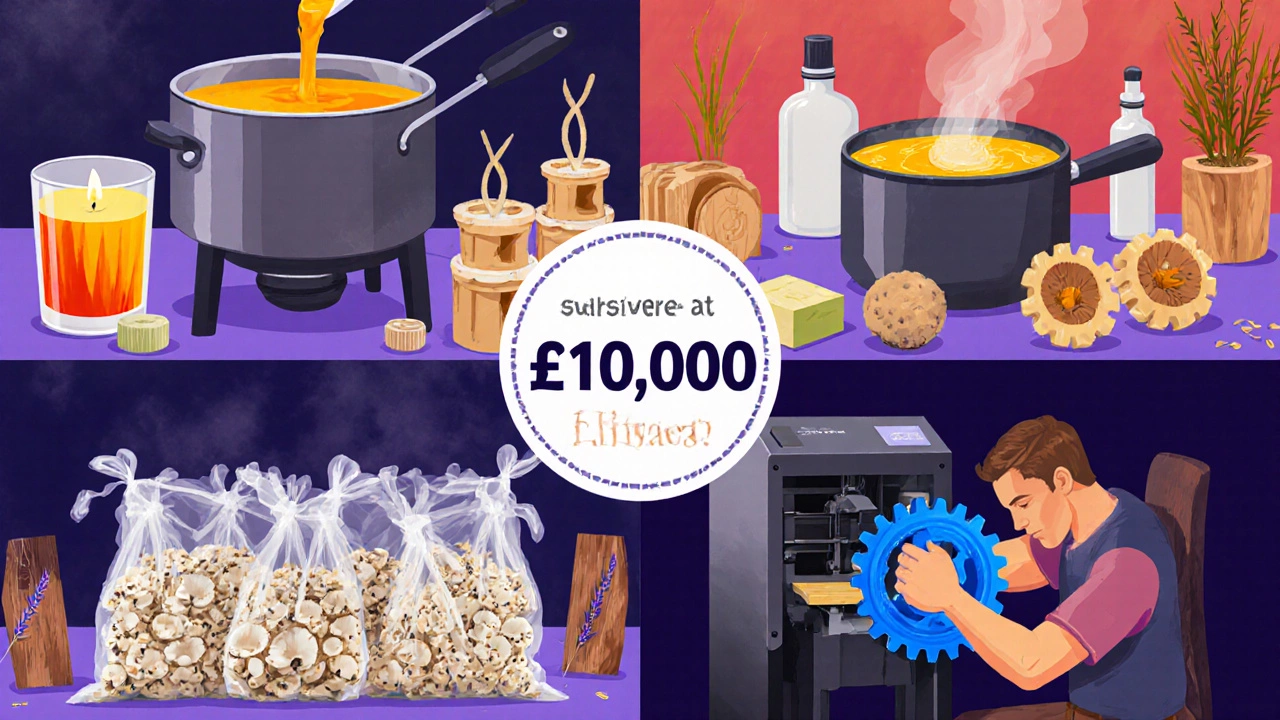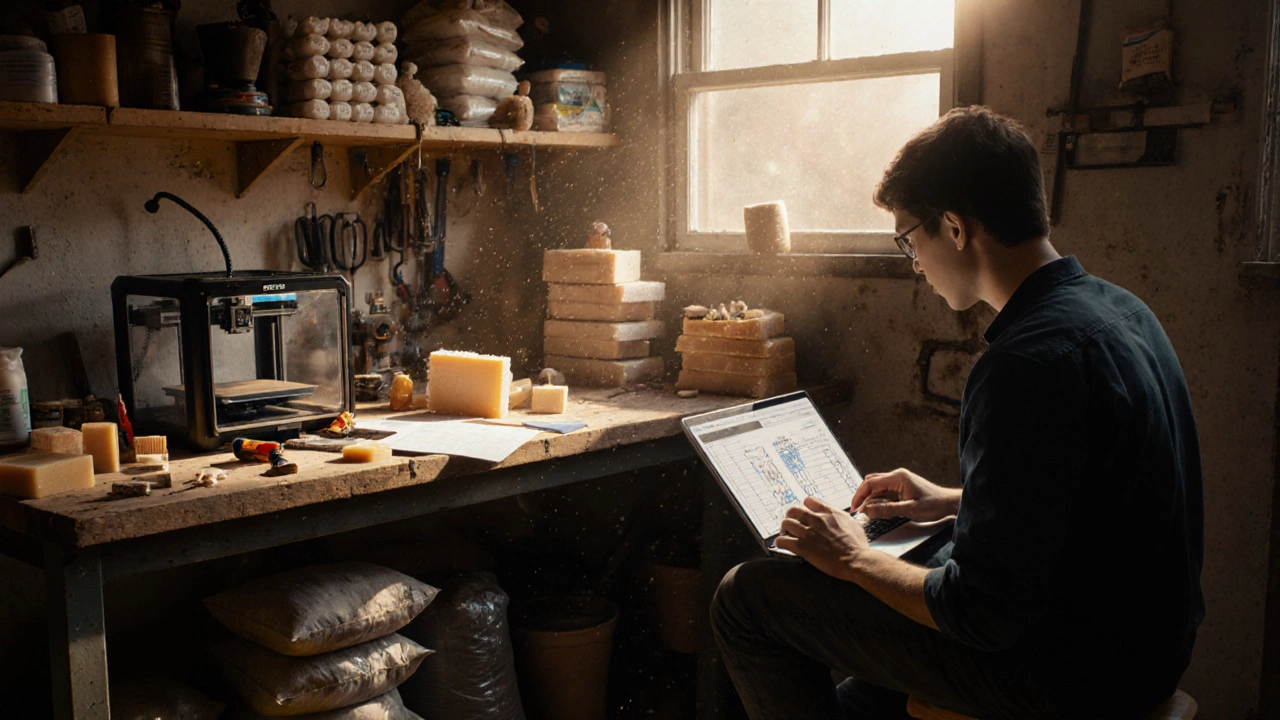Low-Investment Manufacturing Business Calculator
Startup Budget Calculator
Key Business Insights
Based on your input, these low-investment manufacturing businesses would be most suitable:
- Candle Making - 35-45% Margin Startup: £2,500
- Soap Making - 30-40% Margin Startup: £3,000
- Mushroom Farming - 40-55% Margin Startup: £7,500
Your Projected Break-Even Analysis
Break-Even Timeline
Estimated time to cover startup costs
Monthly Profit Potential
Estimated monthly profit after costs
Return on Investment
ROI in first year
| Business Idea | Startup Cost | Estimated Profit Margin | Break-Even Time |
|---|---|---|---|
| Candle Making | £2,500 | 35-45% | 5 months |
| Soap Making | £3,000 | 30-40% | 6 months |
| Mushroom Farming | £7,500 | 40-55% | 4 months |
| 3D Printing Services | £9,000 | 30-50% | 5 months |
| Handcrafted Furniture | £8,000 | 35-50% | 5 months |
When you’re looking for a manufacturing venture that won’t drain your savings but can still deliver solid returns, the sweet spot is a Low‑investment manufacturing business a small‑scale operation that requires modest capital, minimal equipment, and can be launched from a garage, a shed, or a modest workshop. Below you’ll find the five most profitable ideas that fit this profile, why they work in today’s market, and how to get them off the ground with less than £10,000.
Why Low‑Investment Manufacturing Still Pays Off
Most people think manufacturing needs a factory floor and heavy machinery, but the reality is different. The pandemic accelerated demand for locally produced, niche goods, and consumers now value transparency and craftsmanship. This shift lets small players charge premium prices while keeping overhead low. A well‑chosen product line can hit a profit margin of 30‑50%, meaning every £1,000 you invest can bring back £1,300‑£1,500 within the first year.
Top Five High‑Profit, Low‑Cost Manufacturing Ideas
Each business below scores high on three criteria: startup cost under £10,000, profit margin above 30%, and steady market demand in the UK and Europe.
- Candle making - Simple wax, molds, and scents; ideal for home décor and gifting markets.
- Soap making - Artisanal soaps tap into the clean‑beauty trend; requires basic chemicals and molds.
- Mushroom farming - High‑value gourmet varieties grow on low‑tech substrates; perfect for local restaurants.
- 3D printing services - Offer rapid prototyping or custom parts; a single desktop printer can start the business.
- Handcrafted furniture - Upcycled wood + modern designs attract eco‑conscious buyers.
Side‑by‑Side Comparison
| Business | Avg Startup Cost (GBP) | Typical Profit Margin | Skill Requirement | Market Size (UK) |
|---|---|---|---|---|
| Candle making | £2,500 | 35‑45% | Low - basic chemistry | £120M |
| Soap making | £3,000 | 30‑40% | Low‑Medium - formulation | £85M |
| Mushroom farming | £7,500 | 40‑55% | Medium - sterile techniques | £45M |
| 3D printing services | £9,000 | 30‑50% | Medium - CAD basics | £60M |
| Handcrafted furniture | £8,000 | 35‑50% | High - joinery skills | £70M |

Step‑by‑Step Blueprint to Launch
- Validate demand. Use Google Trends, local market surveys, or pre‑order campaigns on Kickstarter to confirm that customers will buy your product.
- Calculate Break‑even analysis. List raw material costs, labor (your own time), utilities, and marketing. Aim for a break‑even point within the first 3‑4 months.
- Secure funding. For under £10,000, personal savings, micro‑loans, or UK government schemes like Start‑up Grant for Small‑Scale Manufacturing are sufficient.
- Set up a compliant workspace. Even a garage must meet health‑and‑safety basics: fire extinguishers, proper ventilation (especially for wax or chemicals), and waste disposal plans.
- Source raw materials from local suppliers to keep shipping costs low and market your “Made‑in‑Britain” story.
- Launch a minimal online store using platforms like Shopify or Etsy. Pair it with a local pop‑up or farmer’s market stall for immediate feedback.
- Track ROI monthly. Adjust pricing, packaging, or advertising spend based on real data.
Key Success Factors & Common Pitfalls
Market niche. Don’t chase generic products; focus on a specific segment - e.g., vegan candles, organic soaps, or heirloom mushroom varieties.
Brand story. Modern buyers love authenticity. Highlight where you source ingredients, your sustainability practices, and the craft behind each item.
Scale wisely. Reinvest profits into better equipment only after you’ve proven demand. Premature expansion can drain cash flow.
Pitfall - underpricing. New entrants often quote low prices to attract customers, but that erodes margins fast. Use cost‑plus pricing: material cost + labor + 30‑40% markup.
Pitfall - ignoring regulations. Some products (e.g., soaps with claim of “antibacterial”) fall under UK cosmetics regulations. Register with the Medicines and Healthcare products Regulatory Agency (MHRA) if needed.

Leveraging Government Schemes and Local Support
The UK offers several incentives for micro‑manufacturers: the Manufacturing Innovation Grant (up to £25,000), regional Enterprise Zones with tax relief, and free mentorship from local chambers of commerce. Check the latest 2025 updates on the GOV.UK portal.
Future‑Proofing Your Business
To stay ahead, consider:
- Adding a subscription box for recurring revenue.
- Partnering with B2B clients - boutique hotels for candles, boutique gyms for soap.
- Exploring eco‑friendly packaging - biodegradable plastics or reusable tins.
- Investing in basic Lean manufacturing techniques to reduce waste and improve throughput.
Quick Checklist Before You Start
- Identify a niche with at least £50,000 annual market potential.
- Confirm total startup cost won’t exceed £10,000.
- Run a break‑even analysis: aim for payback within 6 months.
- Secure funding (personal, micro‑loan, grant).
- Set up compliant workspace and source local raw materials.
- Launch online store + one offline test sale.
- Monitor ROI monthly and adjust.
What is the minimum capital required to start a candle‑making business?
You can launch a basic setup for around £2,000-£3,000 covering wax, molds, fragrance oils, a small melter, and basic packaging. This figure assumes you work from home and use minimal marketing spend.
Are there UK grants specifically for small‑scale manufacturers?
Yes. The UK government runs the Manufacturing Innovation Grant (up to £25,000), regional Enterprise Zone tax reliefs, and the Small Business Grant Fund for equipment purchase. Eligibility usually requires a solid business plan and proof of market need.
How long does it take to see profit in a mushroom farm?
Premium oyster or shiitake varieties can be harvested within 8‑12 weeks after substrate inoculation. With a modest setup (£7,000-£9,000), many growers report reaching break‑even after the first two harvest cycles, roughly 4-6 months.
Do I need a food safety license for soap making?
If your soaps are marketed purely as “cosmetics” (cleansing products) you must comply with the UK Cosmetic Product Regulation, which includes a product information file and safety assessment. No separate food safety license is needed unless you claim therapeutic benefits.
What equipment is essential for a start‑up 3D printing service?
A reliable desktop FDM printer (e.g., Prusa i3 MK4) costing around £800-£1,200, a basic slicer software (free or low‑cost), and a small workbench for post‑processing. Upgrading to a resin printer can expand material options but raises material costs.
